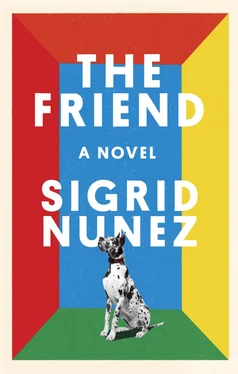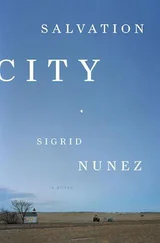Kundera has his own interpretation of Genesis 1:26. True human goodness can come to the fore only when its recipient has no power. Let it be seen, then, how the human race treats those that have been placed at its mercy. And put to this moral test, mankind has suffered . . . a debacle so fundamental that all others stem from it.
Karenin and Tereza are devoted to each other. Reflecting on their pure and selfless bond, Tereza concludes that such love is, if not bigger, nevertheless better than the corrupt, fraught, eternally disappointing and compromised thing she has always had with Tomas.
Idyllic is how Kundera describes human relationships with animals. Idyllic because animals were not expelled with us from Paradise. There they remain, untroubled by such complications as the separation of body and soul, and it’s through our love and friendship with them that we are able to reconnect to Paradise, albeit by just a thread.
Others go further. Dogs are not merely untouched by evil. They are celestial beings, angels incarnate, furry guardian spirits sent to watch over and help people live. Like the deification of cats, this belief is all over the internet, and growing. It makes you wonder. About people, I mean.
• • •
Something very bad happens to a lot of dogs in Disgrace . The question persists, why won’t David Lurie save the one, a mutt that has clearly come to love him and for which he, in turn, feels a special affection. Why can’t that dog—a good dog, crippled but still young, and apparently sensitive to music—be spared the fate of all the other unwanted dogs destroyed at the animal welfare clinic? Why, instead of keeping this one dog, does Lurie insist on sacrificing it?
Remember Agent Starling in The Silence of the Lambs telling Hannibal Lecter how, as a little girl living on her uncle’s ranch, she had desperately wanted to save the lambs from the spring slaughter. How she picked up one lamb and tried to run away. I thought if I could save just one . . . but he was heavy. So heavy. In the end, like Lurie, she could not save an animal marked for death. Not even one.
—
We know they think, but do dogs have opinions?
Kundera makes much of the fact that, unlike us, animals don’t feel disgust. I’m not so sure about this (not even cats?), but that dogs are not critical or judgmental is undeniably a big part of what endears them to us. (This is what made educators think having kids with reading problems read aloud to dogs was such a great idea. Also, perhaps, why performers like Laurie Anderson and Yo-Yo Ma have reported looking out at their concert audience and fantasizing that it’s all dogs.)
Gratitude: I don’t believe people are imagining it when they attribute this feeling to their rescue dog. I often feel that Apollo is grateful toward me.
I want to know if he looks forward to things. She’ll be home soon. Can’t wait to eat! Tomorrow is another day.
Even more, I want to know how he remembers the past. Does he have yearnings? Regrets? Sweet, sweet memories? Bittersweet ones? With senses as keen as theirs, why couldn’t dogs have Proustian moments?
Why couldn’t they have eureka moments, epiphanies, and so on?
In the beginning I sometimes caught him staring at me only to turn away when I looked back. Now he often rests his block of a head on my knees and tips his eyes at me with a speaking expression.
What do you talk to him about? the shrink wanted to know.
Mostly I seem to ask questions. What’s up, pup? Did you have a nice nap? Were you chasing something in your sleep? Do you want to go out? Are you hungry? Are you happy? Does your arthritis hurt? Why won’t you play with other dogs? Are you an angel? Do you want me to read to you? Do you want me to sing? Who loves you? Do you love me? Will you love me forever? Do you wanna dance? Am I the best person you’ve ever had? Can you tell I’ve been drinking? Do these jeans make me look fat?
If we could talk to the animals , goes the song.
Meaning, if they could talk to us.
But of course that would ruin everything.
• • •
Your whole house smells of dog, says someone who comes to visit. I say I’ll take care of it. Which I do by never inviting that person to visit again.
• • •
One night I wake to find Apollo by the bed, apparently trying with his teeth to draw back over me the blanket I must have thrown off in my sleep. When I tell people about this they don’t believe it. They say I must have dreamed it. Which I agree is possible. But really I’m thinking they’re just jealous.
• • •
At a book party. A woman I’ve never met before giggles and says, Aren’t you the one who’s in love with a dog?
Am I? Have I taken a dog husband as Ackerley took a dog wife? Will his death be the saddest day of my life? Will I too want to immolate myself as a suttee? No. But I too have found myself so eager to get home to him that I have jumped in a cab rather than take the train. I too sing with joy at the thought of seeing him, and for sure, this love is not like any love I’ve ever felt before.
• • •
A recurring anxiety: Someone claiming to be Apollo’s owner finally shows up, someone with a crazy but convincing tale of how the two of them got separated, and now I’m expected to give him up.
• • •
Reminded here that I only recently learned that the term puppy love refers to the feeling a person might have for a puppy. Nothing to do, as I’d thought, with a puppy’s feelings for a person.
• • •
Reading Ackerley, I noticed that he sometimes uses the word person when referring to a dog. At first I thought this was a mistake. But, considering that he was one of the most careful writers in the world, I’d say this is unlikely.
• • •
Now reminded of a friend of mine who told me that, for years, he thought the expression was It’s a doggy-dog world and was never quite sure what it meant.
• • •
When they see you with a dog, people tell you dog stories. A man in a business suit strokes Apollo’s head as he tells me how his mother decided one day to abandon a dog she’d had for years. She brought the dog to a bus station and left it in its carrier under a bench. When the man found out, he tracked the dog down to a shelter. He called the shelter to say he’d take the dog, but at the moment he was across the country finishing up law school. The shelter promised to hold the dog, but before he could get there the dog died. He was told that it had simply stopped eating.
I just don’t get it, the man tells me. The dog had been grossly fat because his mother used to feed him doughnuts, he says, but he was also still young and cute and totally adoptable. No way she needed to dump him like that. Though it had happened years ago, he was still trying to understand why his mother would’ve done such a thing.
Because she wanted to hurt someone, I don’t say.
• • •
A public radio producer invites me to contribute a piece about a book, which can be any book I feel strongly about and would recommend to listeners, she says.
In fact, I am familiar with this series, having heard other writers reading on the air their pieces about their favorite books.
I choose The Oxford Book of Death . Not only because it’s a book I really do think everyone should read, but also because I happen to be rereading it, with particular attention to the chapters “Suicide” and “Animals.”
I write the requested five hundred words, praising the anthology’s selection of extracts from ancient to present times on every aspect of the subject, from “Definitions” to “Last Words.” I say how fascinating I found all this writing about death to be, how paradoxically entertaining and full of life the whole book was.
Читать дальше












